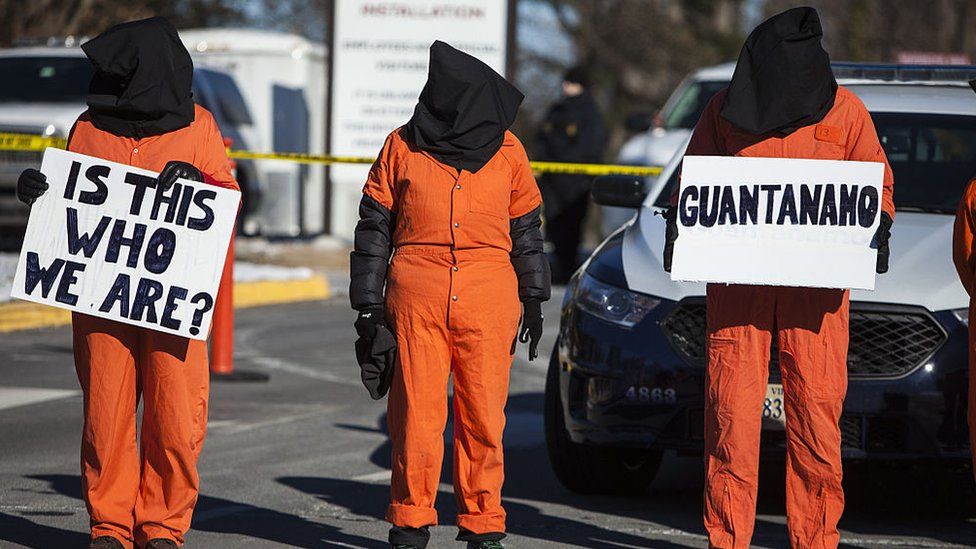A Brief Colonial History Of Ceylon(SriLanka)
Sri Lanka: One Island Two Nations
A Brief Colonial History Of Ceylon(SriLanka)
Sri Lanka: One Island Two Nations
(Full Story)
Search This Blog
Back to 500BC.
==========================
Thiranjala Weerasinghe sj.- One Island Two Nations
?????????????????????????????????????????????????Tuesday, November 2, 2021
Military officers condemn CIA torture as a stain on America

IMAGE SOURCE,GETTY IMAGES Image caption,Techniques used by the CIA after 9/11 remain extremely controversial
Seven senior US officers serving on a military jury have rebuked the alleged CIA torture of a prisoner as "a stain on the moral fiber of America".
A clemency letter from most of the panel, published by the New York Times, condemns the treatment of Majid Khan.
Khan admits working as an al-Qaeda courier and has been in custody since being captured in Pakistan in 2003.
His testimony was the first of its kind by a detainee held in an overseas CIA site in the wake of the 9/11 attacks.
He testified last week about alleged abuse including beatings, waterboarding and being kept chained up in the dark.
He said that "the more I cooperated, the more I was tortured" in CIA custody and said he went on to make up lies in order to appease interrogators.
Khan grew up in Pakistan and moved to the US aged 16. He said he had been a "young, impressionable, vulnerable kid" when he was recruited to the organisation and, now 41, says he rejects both Al-Qaeda and terrorism.
His lawyer said his client was subject to "heinous and vile acts of torture" in custody despite sharing information with US intelligence officials from the outset of his detention.
Khan read out a 39-page statement to a hearing at the Guantánamo Bay naval base in Cuba last week.
His testimony detailed humiliating stretches at multiple sites where he was stripped nude, kept hooded and forced to undergo procedures including enemas. He also described incidents of sleep deprivation, forced feeding and being hung up in chains by interrogators.
Much of what he detailed echoes findings of a key report released in 2014 which examined the CIA's interrogation programme.
- CONTEXT: Report on CIA details 'brutal' interogations
- EXPLAINED: The 20 key findings in 2014 report
Khan was sentenced to 26 years in prison - the lower end of sentencing guidelines - last week after admitting helping al-Qaeda plots in 2002.
But in a letter urging clemency, seven of the eight-member military jury said Khan's treatment "was of no practical value in terms of intelligence, or any other tangible benefit to US interests".
"Instead, it is a stain on the moral fiber of America; the treatment of Mr Khan in the hands of US personnel should be a source of shame for the US government," the letter went on.
US reports say a plea deal, based on the 41-year-old's cooperation with officials in the intervening period since he admitted guilt in 2012, could lead to his release as early as February after almost two decades in US custody.
The conventional argument against torture is based on a simple premise: it does not work. Suspects lie, to avoid the pain. The military officers stated this in their letter: Majid Khan told his interrogators nothing useful.
As military historians and policymakers know, however, torture does work, sometimes. Dennis Blair, a former director of national intelligence for President Obama, said that these types of interrogations can provide "high value information"; other former US officials said that the interrogations helped US authorities develop a better understanding of the structure of al-Qaeda.
Yet the military officers made another argument in their letter, one that carries more weight: they objected to torture on moral grounds. This means that even if torture does work, it is an instrument that is morally reprehensible.
The officers have taken an important step towards a reckoning with the past, and made it less likely that US officials will repeat this mistake in the future.

